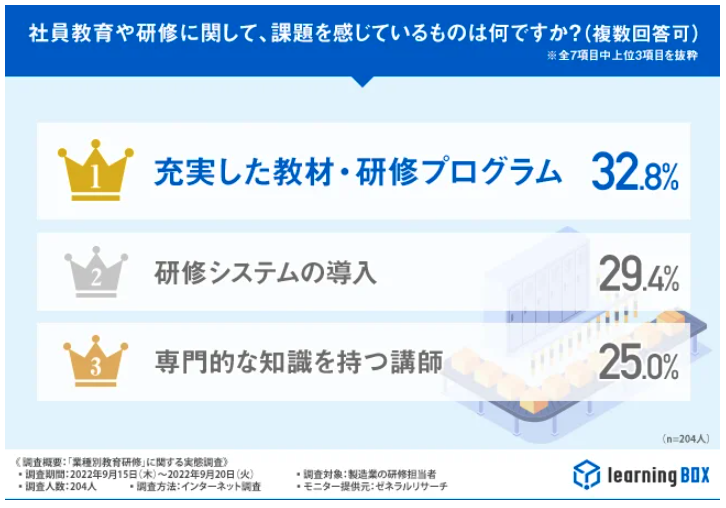LearningBOX, Inc. recently conducted a survey of training managers regarding "education and training by industry.
In this issue, we will publish the results for the manufacturing industry.

Survey Results Topics
The most common difficulty in creating questions for the training was "Assembling the training content.
One out of three training managers in the manufacturing industry feels that "well-developed teaching materials and training programs" are a challenge.
<Survey Summary
1. survey method: web-based questionnaire using monitors from General Research Corporation
2. survey target: training managers in the manufacturing industry among General Research's registered monitors
3. number of valid responses: 204
4. survey dates: September 15, 2022 (Thursday) to September 20, 2022 (Tuesday)
The most common difficulty in creating questions for training was "assembling training content.
A survey of 204 training managers in the manufacturing industry was conducted.
About 90% of the respondents answered "in-house training (87.8%)" as the training format.
Some excerpts of the content are
How does it affect the practical business (40s/Tochigi)
Compliance (50s / Hiroshima Prefecture)
Sanitation (50s / Aomori)
The training seems to focus on the following points.
Furthermore, about half (51.0%) of the respondents change the training content every year, and while about 80% (78.9%) said that it should be changed every year, about half (49.0%) are actually unable to do so.
When asked about the difficulties they face in creating questions for training, the most common response was "Assembling training content (40.2%)," followed by "Devising training content (35.3%)" and "Balancing training and practical skills (28.4%).
The assembly and initiation of training was cited as an issue, and the results showed that the content of the training was being thoughtfully considered.
In addition, manufacturers, who are looking for personnel who can be competitive in actual work, are finding it difficult to find a balance between training and practical skills.
One in three training managers in the manufacturing industry feels that "well-developed teaching materials and training programs" are a challenge.

As for issues they are facing with regard to employee education and training, the most common response was "well-developed teaching materials and training programs (32.8%)," followed by "introduction of a training system (29.4%)" and "instructors with specialized knowledge (25.0%).
They feel that the educational materials and programs are lacking.
Second to this was the introduction of a training system, suggesting that the respondents hoped that the introduction of a system would reduce the burden of preparing for training and other tasks.
Specifically.
There is no one in charge who can provide training due to lack of human resources (30s / Saitama).
I am worried about whether they understand the content of the training (40s / Aichi Prefecture).
The training does not have content that can be immediately applied to work (40s / Hyogo Prefecture).
Due to the overwhelming shortage of personnel, we are forced to start actual work without satisfactory training time and evaluation (50s / Fukuoka).
They feel that they are facing challenges in this regard.
The results suggest that there is a serious shortage of human resources, and it is not uncommon for companies to find that they cannot afford to spend human resources and time on training.
This has also prevented them from improving the quality of their training, and as a result, they are not satisfied with their human resource development.
Finally, we asked about specific things they do to make education and training meaningful.
Listening to the opinions of trainees (30s / Hyogo)
E-learning (40s / Aichi)
Questionnaire after the training (40s / Fukuoka Prefecture)
The respondents answered that they were not sure.
We learned that they try to listen to their trainees and make the time more meaningful for them.
Summary】Manufacturers are concerned about the quality of training content due to a shortage of human resources.
It was found that about 90% of education and training in the manufacturing industry is conducted in-house.
While about 80% of respondents believe that the content of annual training should be changed, one in two said they have not been able to change it.
As for the challenges in training, the respondents cited "well-developed teaching materials and training programs," "introduction of a training system," and "instructors with specialized knowledge," indicating a sense of challenge in improving the quality of training content and a shortage of human resources.
The participants were seen working to make the training meaningful by listening to the trainees' voices to make the training better for them, and by utilizing e-learning to reduce man-hours and costs.